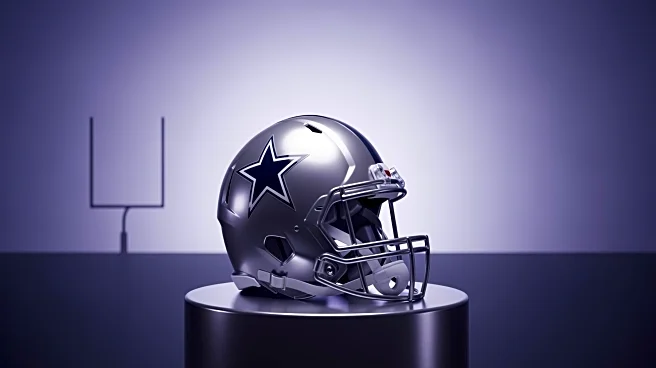What's Happening?
The Dallas Cowboys are set to honor their late teammate Marshawn Kneeland, who passed away at the age of 24, by wearing helmet decals designed by his fellow players. The team plans to wear these decals for the remainder of the season, with the final design chosen
by the players themselves. In addition to the decals, the Cowboys will wear shirts in Kneeland's honor before their upcoming games against the Las Vegas Raiders and Philadelphia Eagles. A moment of silence and a video tribute are planned for the November 23 game against the Eagles, marking the Cowboys' first home game since Kneeland's death. Kneeland, a defensive lineman, was drafted in the second round of the 2024 NFL draft and had played in 11 games as a rookie and seven games this season.
Why It's Important?
The tribute to Marshawn Kneeland underscores the impact he had on his teammates and the organization despite his brief career. It highlights the emotional and personal connections within sports teams, where players often become like family. The decision to honor Kneeland with helmet decals and other tributes reflects the team's commitment to remembering and celebrating his contributions both on and off the field. This event also serves as a reminder of the fragility of life and the importance of community support in times of loss, resonating with fans and players across the league.
What's Next?
The Cowboys will continue to honor Kneeland throughout the season, with the planned tributes serving as a focal point for the team and its supporters. The upcoming games against the Raiders and Eagles will be significant as the team rallies around the memory of their teammate. The organization and fans may also engage in further commemorative activities, fostering a sense of unity and remembrance. The broader NFL community may respond with similar gestures, emphasizing solidarity and compassion within the league.
Beyond the Headlines
This tribute may prompt discussions about the mental health and well-being of athletes, highlighting the pressures they face and the support systems available to them. It could lead to increased awareness and initiatives aimed at providing emotional and psychological support to players. Additionally, the event may inspire other teams to adopt similar practices in honoring past and present players, fostering a culture of respect and remembrance within professional sports.
















